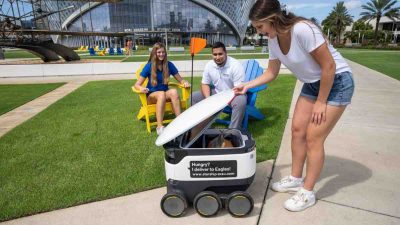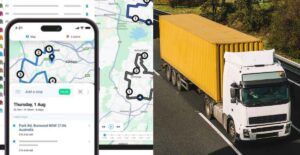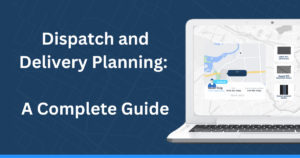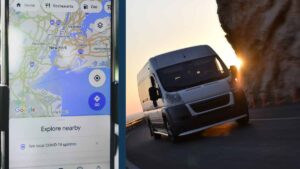Exactly five years ago, Starship Technologies launched its first robot food deliveries at the George Mason University in Virginia. It’s here where it all started gaining momentum for Starship.
The first partnership with the university was one of more than 15 other opportunities on campus that followed. In 2019, it expanded to five universities, while between 2020 and 2022, at the peak of the COVID-19 pandemic, it spread to eight tertiary educational institutions. It was a massive milestone for the company, which didn’t know how big it would turn out in the coming years.
The successful launch of food robot deliveries at George Mason, led to a boost in their finances of $40 million in funding in 2019. From there, it all snowballed and expanded to the following universities:
- Northern Arizona University in Arizona, March 2019 (before receiving funding)
- Purdue University, West Lafayette, 2019
- Wisconsin Madison University, Wisconsin, 2019
- University of Houston, Texas, 2019
- University of Texas at Dallas, 2019
- University of Mississippi, 2020
- Bowling Green University, Ohio, 2020
- Arizona State University, Arizona 2020
- James Madison University, Virginia, 2020
- Georgia Southern University, Statesboro, 2020
- SMU campus, 2022
- Ball State University, 2022
- University of Tulsa, 2022
- University of North Carolina, Charlotte, 2023
- 50 college campuses in the US, 2023
The highlight has been the partnership with Bolt last year and the implementation of its service at 50 college campuses across the US. Starship Technologies says, “Autonomous delivery is no longer a future concept.” Instead, they see it as necessary to solve the industry’s last-mile delivery challenges.
Bolt moves for Starship
One of Starship’s most significant moves was when it partnered with Bolt, Uber’s rival in the food delivery space. With the touch of a button, customers can open the Starship robot and receive their meals or groceries.
Bolt is an established brand with over 100 million customers in 45 countries.
Robot delivery market
The delivery robot market is still growing, with more robot delivery companies setting up shop in the US, while the demand for last-mile delivery solutions increases.
There are concerns about privacy mounting following an incident in Los Angeles last year.
Serve Robotics, which provides service to Uber Eats, helped Los Angeles police by sharing video footage to help with a criminal investigation. The company was subpoenaed to release video footage.
The probe followed an attempted theft of one of the robots. Two suspects were apprehended after the release of the footage. However, this has left a bitter taste in the mouths of some citizens, who are concerned about their privacy if these robots monitor their movement in public spaces.
NOW READ: Curb-climbing robotic food delivery heading to university
About the author
Mia is a multi-award-winning journalist. She has more than 14 years of experience in mainstream media. She's covered many historic moments that happened in Africa and internationally. She has a strong focus on human interest stories, to bring her readers and viewers closer to the topics at hand.












